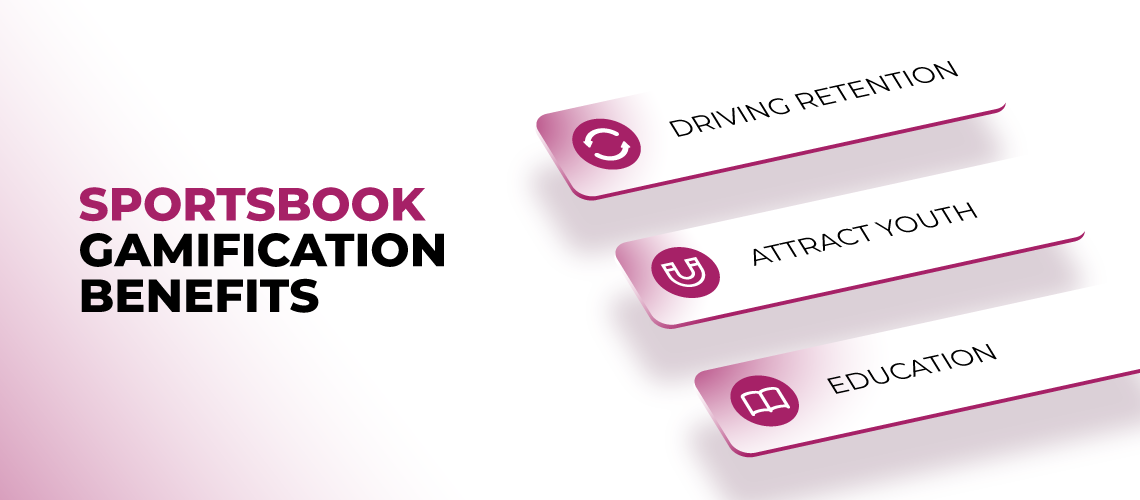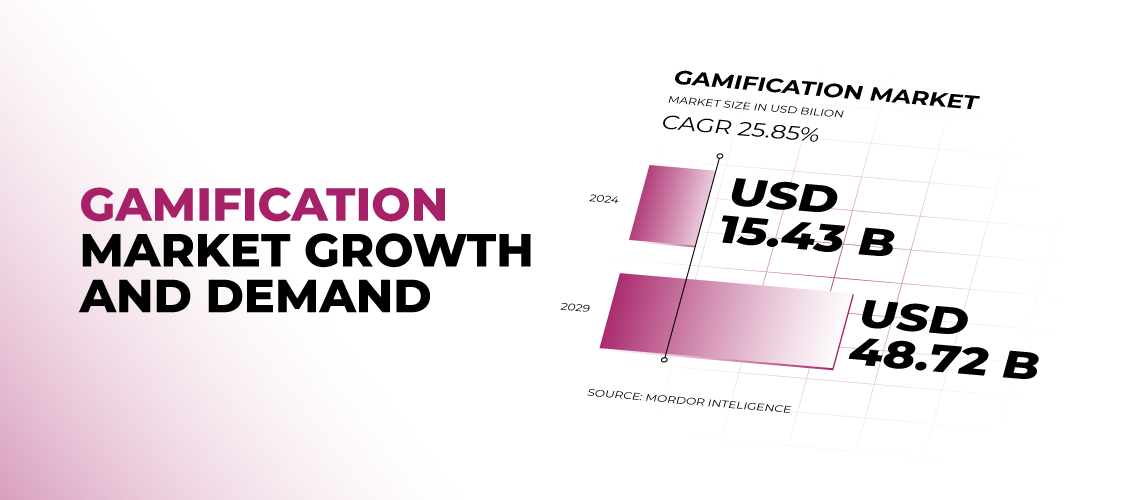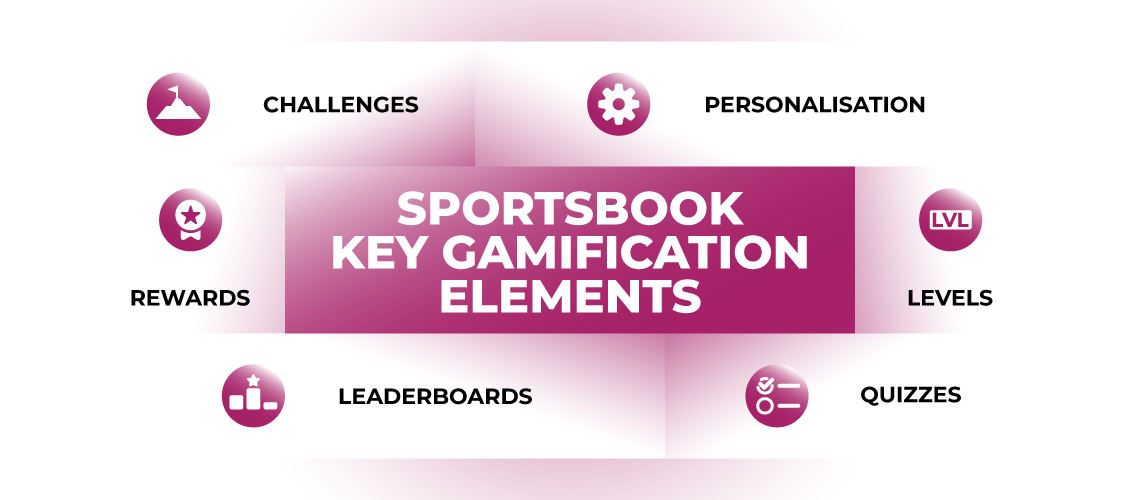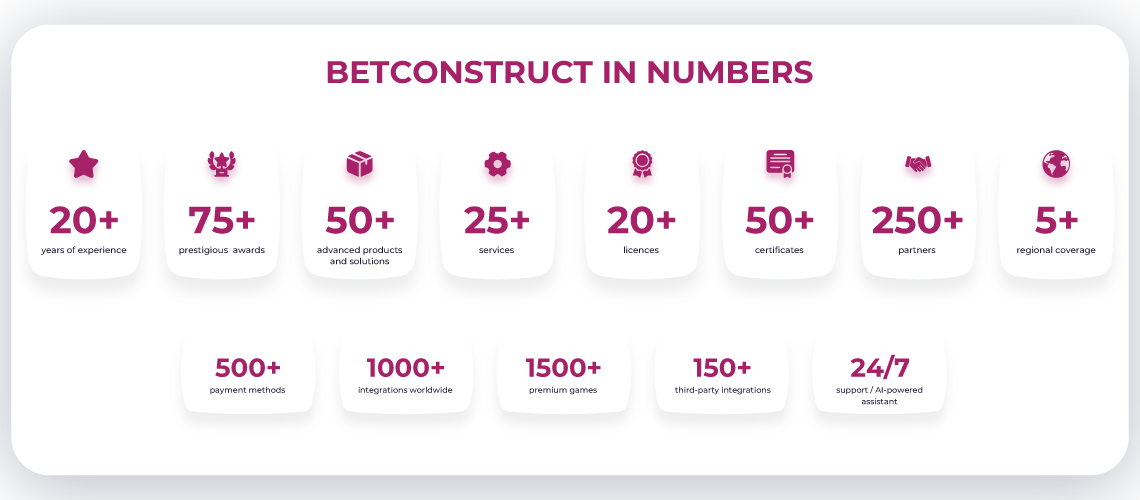As the betting industry evolves, integrating game-like elements into sports betting software has become an essential requirement, reshaping how users interact with sportsbooks. This comprehensive guide will delve into the multifaceted world of gamification, providing valuable insights into how it enhances the betting experience and drives user engagement.
In this article, we will start by defining gamification in the context of sports betting and explore the underlying theories from behavioural psychology that make these strategies effective. We will also highlight the benefits of gamification, examine the current market growth and demand, and outline the best techniques for integrating gamified elements into sports betting software. In addition, we will discuss the key components of gamification in sportsbook software, from interactive leaderboards to personalised betting experiences. Finally, we will look ahead at the future of gamification in sports betting, identifying emerging trends and innovations that are set to transform the industry.
As a leading iGaming company with an advanced toolset of gamification products and solutions, BetConstruct will help you navigate the exciting realm with its techniques and elements for enhanced player engagement.
What is Gamification in Sports Betting Software?
In general, gamification is applying game design elements and principles in non-gaming contexts to enhance user engagement and experience. For example, there are applications for education (Duolingo for language learning), fitness (Fitbit for tracking and competing in physical activities), workplace productivity (Trello and Asana with task achievements) etc. In sports betting, this concept involves integrating features like leaderboards, rewards, challenges, and achievements within the sports betting software. These elements make the betting process more interactive and enjoyable for users, transforming a standard betting experience into a dynamic and entertaining activity.
Modern sportsbook software leverages gamification to attract and retain bettors by offering a more engaging platform. For instance, sports betting software providers incorporate features such as daily challenges where users can earn points or bonuses for placing certain types of bets or reaching specific milestones. Leaderboards allow bettors to compete against each other, fostering a sense of community and competition.
Betting software that employs gamification can also introduce loyalty programs, where users accumulate points or rewards for consistent betting activity. These points can often be redeemed for free bets, and merchandise encouraging continued engagement with the platform. By integrating these elements, sports betting software providers create an immersive environment that keeps users returning, ultimately driving higher user retention and increased betting activity.
Gamification in sports betting not only enhances the user experience but also provides valuable insights for operators. By tracking user engagement and preferences through gamified elements, sportsbook software can tailor marketing efforts and promotional campaigns more effectively. To sum up, gamification in sports betting goes beyond just adding fun elements; it's a strategic method for driving business growth.
Gamification Theory and Behavioral Psychology
Gamification theory is deeply rooted in behavioural psychology, explaining why users are drawn to these elements and how they influence their behaviour. At its core, gamification taps into fundamental human desires for achievement, competition, and social interaction. Sports betting software uses these principles to create engaging experiences that keep users coming back.
One key psychological concept in gamification is the reward system. Sports betting software providers incorporate rewards such as points, badges, and bonuses, which activate the brain's dopamine pathways, creating a sense of pleasure and satisfaction. This positive reinforcement encourages users to continue participating in the betting activities, hoping to earn more rewards.
Another important aspect is the sense of accomplishment and progress. Betting software often features leaderboards and achievement levels, providing users with clear goals and milestones. This sense of progress not only motivates users to place more bets but also fosters a competitive spirit as they strive to outperform others.
Social interaction is another crucial element. Many sportsbook software platforms integrate community features, allowing users to share achievements, compete in challenges, and interact with fellow bettors. This social connectivity satisfies the innate human need for social belonging and validation, further enhancing the overall user experience.
By understanding and leveraging these psychological principles, sports betting software providers can create highly engaging platforms that effectively attract and retain users.

The Benefits of Gamification in Sports Betting Software
Gamification is revolutionising the sports betting industry by delivering a range of benefits in addition to entertainment. Sportsbooks and sports betting software providers incorporate gamified elements for the following advantages:
Giving Competitive Edge: Integrating gamification into sportsbook software allows operators to differentiate themselves in a crowded market. By offering unique, interactive features, betting platforms can stand out from the competition, attracting a loyal user base and maintaining market relevance. This edge is crucial in a sector where user preferences are continually evolving.
Driving Retention and Engagement: Gamified elements like leaderboards, challenges, and reward systems significantly boost user engagement. These features not only make the betting experience more exciting but also incentivise users to return frequently, fostering higher retention rates. Engaged users are more likely to explore various betting options and remain active on the platform.
Enhancing User Experience: Gamification transforms the sports betting journey into an interactive adventure. By incorporating game-like features, sports betting software enhances overall user satisfaction, making the process more enjoyable and immersive. This positive experience leads to longer session times and increased betting activity.
Building a Sense of Achievement and Progression: Gamified sports betting platforms often include progression systems, where users can earn points, badges, or levels based on their betting activity. This not only provides a sense of accomplishment but also motivates users to achieve new milestones, creating a more fulfilling betting experience.
Educating Through Entertainment: Gamification offers a unique opportunity to educate users about the nuances of sports betting in an entertaining manner. Interactive tutorials, quizzes, and simulation games can help new bettors understand complex concepts and strategies, making them feel more confident and informed.
Attracting a Younger Demographic: Generation Z and Alpha are digital natives who value interactive and immersive experiences. Gamification appeals to these younger audiences by aligning with their preferences for engaging content. By incorporating gamified features, sports betting software can attract and retain younger users who are looking for more than traditional betting options.
Encouraging Social Interaction: Gamified elements often include social features like sharing achievements or competing against friends. This social aspect not only enhances the betting experience but also creates a sense of community, further driving user engagement.
Allowing Personalisation and Customisation: Advanced betting software allows for personalised gamification experiences, tailoring challenges and rewards to individual user preferences. This level of customisation ensures that the gamified elements resonate with users.
In short, sportsbooks can leverage gamification to build a more vibrant and dynamic betting environment by enhancing user engagement, satisfaction, and retention.

Gamification Market Growth and Demand
The Gamification Market Analysis reports that the global gamification market is valued at USD 15.43 billion in 2024 and is anticipated to expand to USD 48.72 billion by 2029, with a compound annual growth rate (CAGR) of 25.85%. Another important study suggests that the companies that incorporate gamification elements are 7 times more profitable than those that do not.
The intersection of gamification and sports betting is not just a trend—it's a dynamic shift that is fueling substantial growth in the industry. As we can see from the numbers, the integration of gamification elements into sportsbook software has become a critical factor for sports betting software providers aiming to stay competitive.
The growing demand for complex and engaging sports betting experiences underscores the need for advanced sports betting software solutions. Providers are responding by incorporating gamification into their offerings, creating a more immersive and enjoyable environment for users. As this trend continues to evolve, the market for sports betting software is expected to expand, with gamification at its core.
Best Techniques for Gamifying Sports Betting Software
Gamifying sports betting software involves employing various techniques to create a more engaging and interactive experience for users. By incorporating these methods, sportsbook software providers can significantly enhance the appeal of their platforms. Here are some effective strategies to consider:
Creating a Sense of Ownership and Control: One technique to gamify betting software is to provide users with a sense of ownership over their betting experience. Features such as customisable betting dashboards or personal betting histories allow users to feel more in control. For example, users could personalise their profiles with avatars or themes, making their betting experience unique to them.
Introducing Scarcity and Urgency: Scarcity and urgency drive action by creating a sense of limited availability. Implementing features like time-limited betting promotions or exclusive betting opportunities can prompt users to participate more actively. For instance, a sportsbook might offer limited-time odds boosts or special events that are only available for a short period, encouraging users to place bets before the opportunity expires. Countdown timers or claiming limited availability encourage consumers to make swift purchasing decisions.
Utilising Feedback Loops: Feedback loops are crucial for keeping users engaged by providing timely responses to their actions. Incorporate instant feedback mechanisms such as real-time notifications of wins, losses, or achievements. For example, after placing a bet, users could receive immediate updates on their bet status, including detailed results and statistics. This instant feedback helps users stay informed and motivated.
Fostering Social Betting: Social betting features enhance user interaction by allowing bettors to share their experiences and compete with friends. Examples include leaderboards where users can see how they stack up against others or social betting challenges where users can invite friends to bet on specific events. By integrating these social elements, sports betting software can create a more communal and competitive environment.
Incorporating Progression Systems: Implementing progression systems, such as levels or tiers, encourages users to engage more deeply with the platform. For instance, users could advance through different levels based on their betting activity, unlocking rewards or exclusive features as they progress. This technique not only motivates users to bet more but also provides a sense of advancement.
Rewarding Milestones and Achievements: Recognising user milestones and achievements through rewards or badges can enhance the betting experience. For example, sports betting software might award badges for consecutive wins, high betting volumes, or participation in special events. These rewards provide tangible recognition for users' betting efforts and encourage continued engagement.
Creating Interactive Challenges: Gamified sports betting software can introduce interactive challenges or missions that users can complete to earn rewards. These challenges might involve betting on specific types of events, achieving certain betting targets, or participating in themed betting activities. Such challenges add an extra layer of excitement and purpose to the betting experience.
By employing these gamification techniques, sportsbook software providers can create a more engaging and rewarding betting experience.

10 Key Elements of Gamification in SportsBook Software
Gamification in sports betting software is transforming the betting landscape, making it more interactive and enjoyable. Here’s a look at some key elements that are driving growth and user satisfaction:
- Competitive Leaderboards: Leaderboards are a cornerstone of gamification in betting software. By showcasing the top-performing users based on their betting activities, sportsbook software fosters a sense of competition. For instance, a betting app might display a weekly leaderboard where users earn spots based on the number of successful bets or their betting volume. This competitive element encourages users to bet more frequently and strategically to climb the ranks.
- Mission-Oriented Challenges: Missions and challenges are integral to gamified sports betting. These could involve tasks such as betting on a series of games or achieving certain betting goals. For example, sports betting software might set a challenge to predict outcomes for all matches in a specific tournament, with rewards for users who complete the mission. These challenges keep the betting experience fresh and engaging.
- Progressive Levels and Milestones: Many sportsbook software solutions incorporate levelling systems that reward users as they progress. Users might start as ‘Novice Bettors’ and advance to ‘Expert Gamblers’ by completing certain tasks or reaching betting milestones. Each level could unlock new features or rewards, such as exclusive promotions or higher betting limits, enhancing the overall experience.
- Points, Badges, and Evolving Rewards: Implementing a points and badges system adds a layer of achievement to sports betting software. Users earn points for various activities, which can be redeemed for rewards or used to earn badges. For instance, a sportsbook might offer a ‘High Roller’ badge for users who place large bets frequently or a ‘Winning Streak’ badge for consecutive successful bets. Progressive rewards that grow in value with user engagement further incentivise continued participation.
- Tailored Personalisation: Personalisation in betting software involves customising the user experience based on individual preferences and behaviours. Sports betting software providers can use data analytics to tailor recommendations, offer targeted promotions, and suggest bets aligned with user interests.
- In-Play Betting Challenges: In-play challenges are designed to keep users engaged during live matches. Sports betting software might offer real-time betting tasks, such as predicting the next goal scorer or the outcome of the next quarter. These challenges make live betting more interactive and thrilling, enhancing the overall excitement.
- Predictive Quizzes: Incorporating predictive quizzes adds an educational and entertaining element to sports betting. Users might participate in quizzes that test their knowledge about upcoming matches or sports events. For example, a sportsbook could host a quiz predicting the outcome of an entire season or specific matches, offering rewards for accurate predictions.
- Streak Betting Rewards: Streak betting encourages users to place bets consistently over some time. For instance, a sportsbook might reward users who place bets every day for a week or who achieve a series of successful bets with bonus credits or special prizes. This feature fosters regular engagement and betting activity.
- Story-Driven Betting Experiences: Storyline betting introduces a narrative element to sports betting. Users might follow a storyline where their betting decisions influence the outcome of an ongoing story or event. For example, a sportsbook could create a fictional sports league with story arcs, where users’ bets impact the progression of the league’s story.
- Virtual Currency Systems: Many betting platforms now use virtual currencies as part of their gamification strategy. Users earn virtual currency through betting activities, which can be used to participate in exclusive games, buy virtual items, or unlock special features. This system adds a layer of excitement and provides additional incentives for user engagement.
By incorporating these gamification elements, sports betting software providers can create a more dynamic and engaging experience for users. These features foster long-term loyalty and increase user satisfaction.
The Future of Gamification in Sports Betting: Trends and Innovations
The future of gamification in the sports betting realm is set for transformative changes, driven by evolving user expectations and advancements in modern technology. Here are some of the upcoming trends:
Immersive Experiences with Modern Technologies (VR, AR, AI, etc.)
The future of gamification in sportsbook software is moving towards more immersive and interactive experiences. Virtual and augmented reality (VR and AR) technologies are expected to become more prevalent, allowing users to experience live sports events in a virtual environment. For instance, there can be a virtual sports bar where users can watch games with friends, place bets in real-time, and participate in virtual betting challenges, all from their own homes.
New Generational Engagement
Grasping the nuances of how various player demographics interact with games is essential in the betting industry. Gen Z and Gen Alpha are shaping the future of sports betting with their tech-savvy and interactive preferences.
Gen Z, born between the mid-1990s to early 2010s values personalisation and immersive experiences. They are drawn to gamified betting platforms that offer dynamic features such as interactive leaderboards, real-time betting challenges, and personalised missions. Gen Alpha, born from 2010 onwards, is growing up in a highly digital environment and will expect even more advanced gamification features.
To stay relevant, betting software providers should incorporate AI-driven personal betting assistants or virtual influencers that interact with users and guide them through betting processes, enhancing the overall experience.
Ethical and Responsible Gamification
As gamification becomes more sophisticated, there will be a growing emphasis on ethical practices and responsible gaming. Sports betting software providers will need to balance engagement with safeguards to ensure users do not develop unhealthy betting habits. Implementing features such as self-regulation tools, educational resources, and responsible gaming prompts will be essential to maintaining a positive user experience.
By staying ahead of these trends and focusing on interactive, personalised, and responsible gaming experiences, sports betting software providers can engage the next generation of bettors with a more immersive betting environment.
Gamify your Betting Software Software with BetConstruct
With 20+ years of experience and 10.000+ integrations worldwide, BetConstruct is a leading betting and iGaming software provider known for its award-winning solutions, global reach, and continually expanding portfolio of advanced products and solutions.

BetConstruct can help to gamify your betting software by providing all the essential tools, such as:
Design and Creation of Bonuses and Promos: Engage users with tailored bonuses and promotional offers.
Social Network with Live Chat: Foster a community through interactive social features.
Bonus Engine Integration: Integrate bonus systems with ease to enhance player rewards.
Leaderboards: Motivate players with competitive leaderboards.
Missions: Increase player engagement through mission-based challenges.
Points: Implement a points system to reward user activity.
Levels: Encourage progress with a levelling system.
Badges: Recognise achievements with digital badges.
Tournaments: Host exciting tournaments to drive competition.
Multi-Currency and Multi-Language Support: Reach users worldwide.
24/7 AI-Powered Assistant: Offer continuous support through AI-driven solutions.
Contact BetConstruct to learn more about how to elevate your betting platform.
As a Concluding Note
In conclusion, gamification is revolutionising the sports betting industry by merging excitement betting with thrilling gamification elements. The benefits of gamification are evident in enhanced user engagement, increased player retention, and higher revenues. As the demand for gamified solutions grows, the market continues to expand, offering endless opportunities for innovation.
Implementing the best techniques to gamify sports betting software is crucial for staying competitive. Key elements such as leaderboards, achievements, and social features play a significant role in crafting an immersive betting environment.
BetConstruct is at the forefront of sports betting software innovation, providing advanced features and products of gamification for your sportsbook software. Transform your sportsbook software with the power of gamification.
















